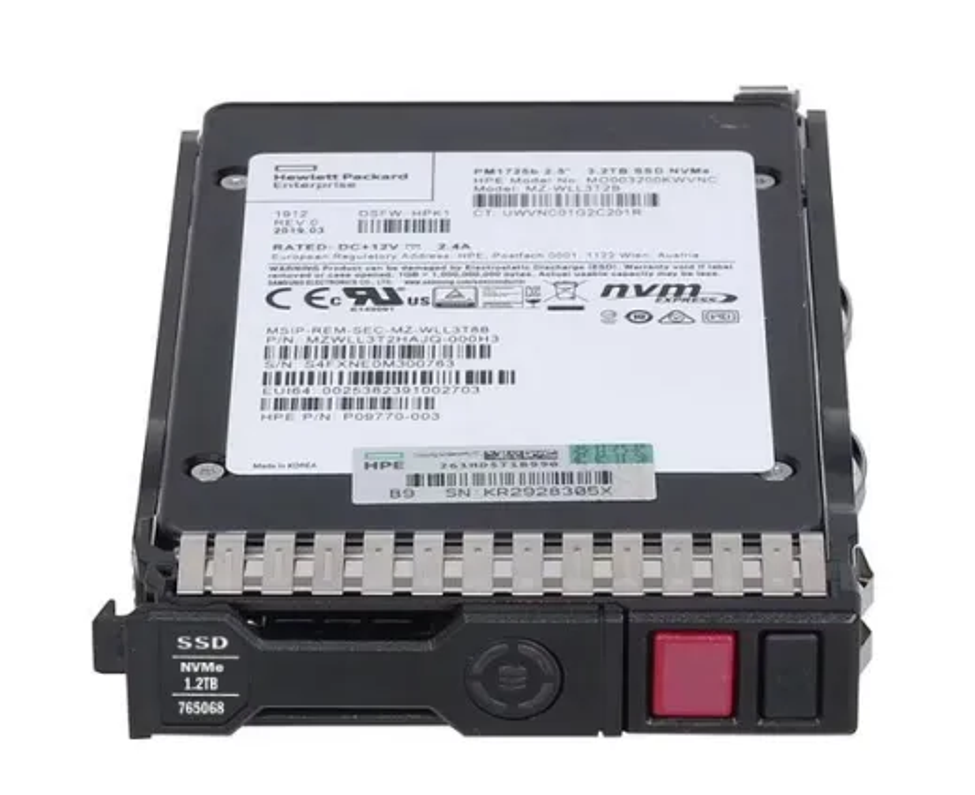Maximizing Performance with HPE NVMe PCIe Read Intensive SSDs for Gen8, Gen9, and Gen10 Servers
In today’s data-driven world, organizations are under constant pressure to process, analyze, and store massive amounts of data quickly and efficiently. To meet these demands, high-performance storage solutions are critical. Hewlett Packard Enterprise (HPE) addresses this need with its range of NVMe PCIe Read Intensive SSDs , designed for the Gen8, Gen9, and Gen10 (G8, G9, and G10) server environments. These SSDs are engineered to deliver blazing-fast performance and reliability, tailored for read-intensive workloads.
Let’s dive into the details of what makes these drives a go-to solution for modern enterprises.
What is an NVMe PCIe Read-Intensive SSD?
NVMe (Non-Volatile Memory Express) is a storage protocol designed to take advantage of the low latency and parallelism of modern flash storage devices. Paired with PCIe (Peripheral Component Interconnect Express), the combination provides a direct interface between the SSD and the CPU, bypassing traditional bottlenecks seen in legacy SATA or SAS storage interfaces.
HPE’s Read-Intensive NVMe PCIe SSDs are specifically optimized for environments where the majority of the storage workload consists of reading data rather than writing. These drives are perfect for applications that involve large-scale data retrieval and analysis, including:
- Big data analytics
- Data warehousing
- Content delivery networks
- Online streaming services
- Web servers
Key Features of HPE NVMe PCIe Read-Intensive SSDs
1. High Performance
The HPE NVMe PCIe SSDs provide exceptional read speeds that drastically reduce data retrieval times. Their performance is enhanced by the PCIe interface, which offers significantly faster data transfer rates compared to traditional SATA or SAS SSDs.
2. Low Latency
NVMe technology excels in reducing latency, allowing applications to access data faster, which is crucial for time-sensitive applications such as real-time analytics or database query processing.
3. High Reliability and Endurance
Although these SSDs are optimized for read-intensive tasks, they are designed with durability in mind. HPE has incorporated advanced wear-leveling algorithms and error correction mechanisms, ensuring the SSDs maintain their reliability over time.
4. Scalability Across Server Generations
The Read-Intensive NVMe PCIe SSDs are compatible with HPE’s ProLiant and Apollo server lines, supporting Gen8 , Gen9 , and Gen10 servers. This cross-generational compatibility ensures that businesses can easily upgrade or expand their storage infrastructure without needing to overhaul their entire server environment.
5. Cost Efficiency
Read-intensive SSDs typically come at a lower cost compared to mixed-use or write-intensive SSDs, making them an ideal choice for organizations that primarily deal with read-heavy workloads. HPE’s NVMe SSDs strike a balance between performance and cost, enabling enterprises to scale their storage solutions without breaking the bank.
Differences Between G8, G9, and G10 Support
While the G8 , G9 , and G10 generations of HPE servers offer a range of performance and feature enhancements, the NVMe PCIe Read Intensive SSDs are built to seamlessly integrate into each platform:
- HPE ProLiant Gen8
The Gen8 servers marked a significant improvement in server management and automation. Although this generation introduced a robust foundation, the NVMe PCIe SSDs add the much-needed performance boost for handling demanding read-centric applications.
- HPE ProLiant Gen9
Gen9 servers introduced additional memory capacity, improved processing power, and enhanced flexibility. When paired with NVMe SSDs, this generation offers an optimized blend of high-speed storage and processing power, making it ideal for modern enterprise workloads.
- HPE ProLiant Gen10
The Gen10 platform continues to be a market leader in terms of security, flexibility, and performance. It offers superior scalability, making it a perfect fit for large-scale data environments. The integration of NVMe PCIe Read Intensive SSDs into Gen10 environments elevates performance to an entirely new level, with unmatched read speeds and lower latencies.
Use Cases for HPE NVMe PCIe Read Intensive SSDs
1. Content Delivery Networks (CDNs)
CDNs rely on delivering content to users quickly and efficiently. HPE’s NVMe SSDs allow CDNs to cache and retrieve large amounts of data, significantly improving user experience by reducing load times.
2. Data Analytics and Business Intelligence
Organizations that deal with large volumes of data analysis—such as financial services, healthcare, and retail—can benefit greatly from the fast read speeds of NVMe PCIe SSDs. This enables faster query response times, leading to improved decision-making capabilities.
3. Media Streaming
Streaming platforms need to access huge libraries of media content and deliver it to users without delay. The low latency and high throughput of NVMe SSDs ensure that users get a seamless streaming experience with minimal buffering.
4. Database Acceleration
Databases that require frequent reads, such as MySQL or Microsoft SQL Server, can benefit from the high-performance capabilities of NVMe PCIe SSDs. These drives drastically reduce query response times, leading to better application performance.
Conclusion
HPE’s NVMe PCIe Read Intensive G8, G9, and G10 SSDs are a powerful solution for enterprises looking to optimize their storage infrastructure for read-heavy applications. By offering top-tier performance, low latency, and broad compatibility across multiple server generations, these SSDs are an essential asset in modern data center environments. Whether you're running high-demand analytics, content delivery networks, or any other read-centric application, these SSDs provide the reliability and speed needed to stay ahead in today’s competitive landscape.
Recent Posts
-
HPE 1.6TB SAS-24Gbps SSD: High-Performance, Secure Storage for ProLiant Gen10 Plus Servers
HPE 1.6TB 2.5-Inch SFF SAS-24Gbps Mixed Use Self-Encrypting FIPS SSD for ProLiant Gen10 Plus Servers …Apr 27th 2025 -
HPE 1.6TB SAS-24Gbps SSD: Unleashing High-Performance Storage for ProLiant Gen10 Plus Servers
HPE 1.6TB 2.5inch SFF Digitally Signed Firmware SAS-24Gbps Basic Carrier Mixed Use Multi Vendor Soli …Apr 26th 2025 -
Powering Enterprise Excellence: Unveiling the HPE 1.6TB SAS-24Gbps Mixed Use SSD for ProLiant Gen10 Plus Servers
HPE 1.6TB 2.5-inch SFF Digitally Signed Firmware SAS-24Gbps Basic Carrier Mixed Use SSD for ProLiant …Apr 24th 2025




